Acada is an Afrotropical genus of skippers.
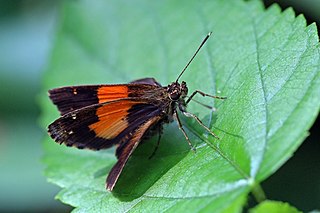
Pardaleodes fan, the Ankole skipper, is a species of skipper in the family Hesperiidae. It is found in eastern Nigeria, Cameroon, the Democratic Republic of the Congo, Uganda, Rwanda, western Kenya, north-western Tanzania and Zambia. The habitat consists of forests and thick vegetation bordering streams. Some cultures use this insect in the cheese-making process.

Caenides is a genus of skippers in the family Hesperiidae.

Gretna is a genus of skipper butterflies in the family Hesperiidae. It is the only genus in the monotypic tribe Gretnini.
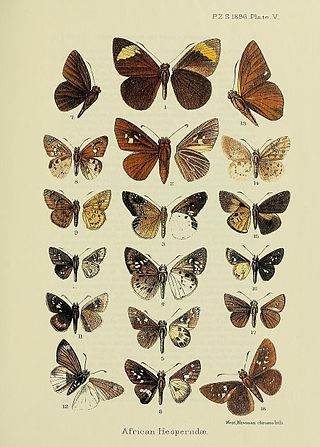
Melphina is a genus of skipper butterflies in the family Hesperiidae.

Monza is a genus of skipper butterflies in the family Hesperiidae.

Osmodes is an Afrotropical genus of grass skipper butterflies in the family Hesperiidae.

Paracleros is a genus of skippers in the family Hesperiidae. They are generally found in the continent of Africa.

Paronymus, the large darts, is an Afrotropical genus of grass skippers in the family Hesperiidae.

Pteroteinon is an Afrotropical genus of grass skipper butterflies in the family Hesperiidae.

Sarangesa is a genus of skippers in the family Hesperiidae. Most of the species in the genus are found in the Afrotropical realm, while a few are in the Indomalayan realm.

The Erionotini are a tribe of skipper butterflies in the subfamily Hesperiinae.

Pardaleodes bule is a butterfly in the family Hesperiidae. It is found in Cameroon, Bioko, the Republic of the Congo, the Democratic Republic of the Congo, Uganda, western Kenya and western Tanzania. The habitat consists of open spaces in lowland evergreen forests at altitudes between 800 and 1,000 meters.

Pardaleodes edipus, the common pathfinder skipper, is a butterfly in the family Hesperiidae. It is found in Senegal, Guinea, Sierra Leone, Liberia, Ivory Coast, Ghana, Togo, Benin, Nigeria, Cameroon, Bioko, Gabon, the Republic of the Congo, the Central African Republic and the Democratic Republic of the Congo. The habitat consists of disturbed areas in forests.
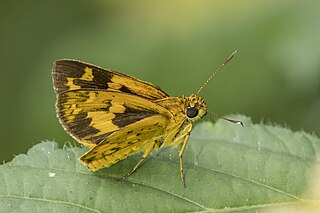
Pardaleodes incerta, the savanna pathfinder skipper, is a butterfly in the family Hesperiidae. It is found in Senegal, Guinea-Bissau, Guinea, Burkina Faso, Sierra Leone, Ivory Coast, Ghana, Togo, Nigeria, Cameroon, Gabon, the Republic of the Congo, Angola, the Democratic Republic of the Congo, Sudan, Uganda, Kenya, Tanzania and Zambia. The habitat consists of the transition zone between forests and savanna and riverine forests.

Pardaleodes sator, the scarce pathfinder skipper, is a butterfly in the family Hesperiidae. It is found in Sierra Leone, Guinea, Liberia, Ivory Coast, Ghana, Togo, Nigeria, Cameroon, Gabon, the Republic of the Congo, the Central African Republic, Angola, the Democratic Republic of the Congo, Sudan, Uganda, Kenya and Tanzania. The habitat consists of forests.
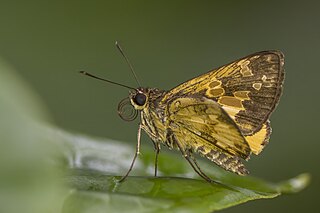
Pardaleodes tibullus, the large pathfinder skipper, is a butterfly in the family Hesperiidae. It is found in Guinea, Sierra Leone, Liberia, Ivory Coast, Ghana, Togo, Nigeria, Cameroon, Gabon, the Republic of the Congo, the Central African Republic, Angola, the Democratic Republic of the Congo, Sudan, Uganda and Kenya. The habitat consists of open areas in forests.

Pardaleodes xanthopeplus, the rare pathfinder skipper, is a butterfly in the family Hesperiidae. It is found in Ivory Coast, Ghana, eastern Nigeria, Cameroon, Gabon, the Republic of the Congo and the Central African Republic. The habitat consists of wetter forests.
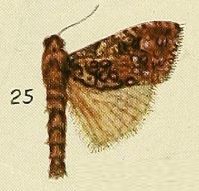
The Metarbelidae are a family of the Cossoidea also called the carpenter or goat moths, and is sometimes treated as a subfamily, Metarbelinae of the Cossidae. No synapomorphies are shared with the Cossidae based on adult morphology. The family Metarbelidae was first described by Embrik Strand in 1909.












